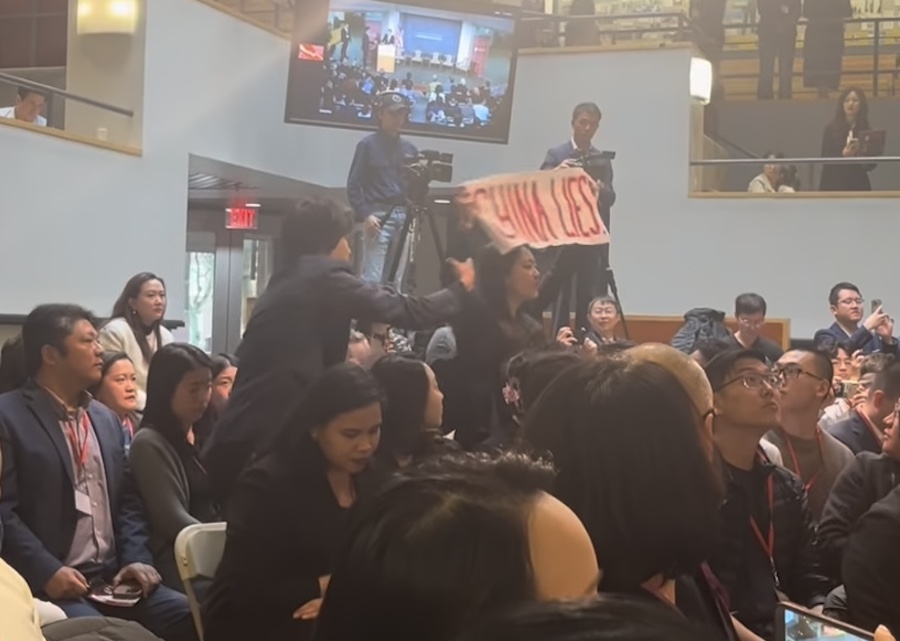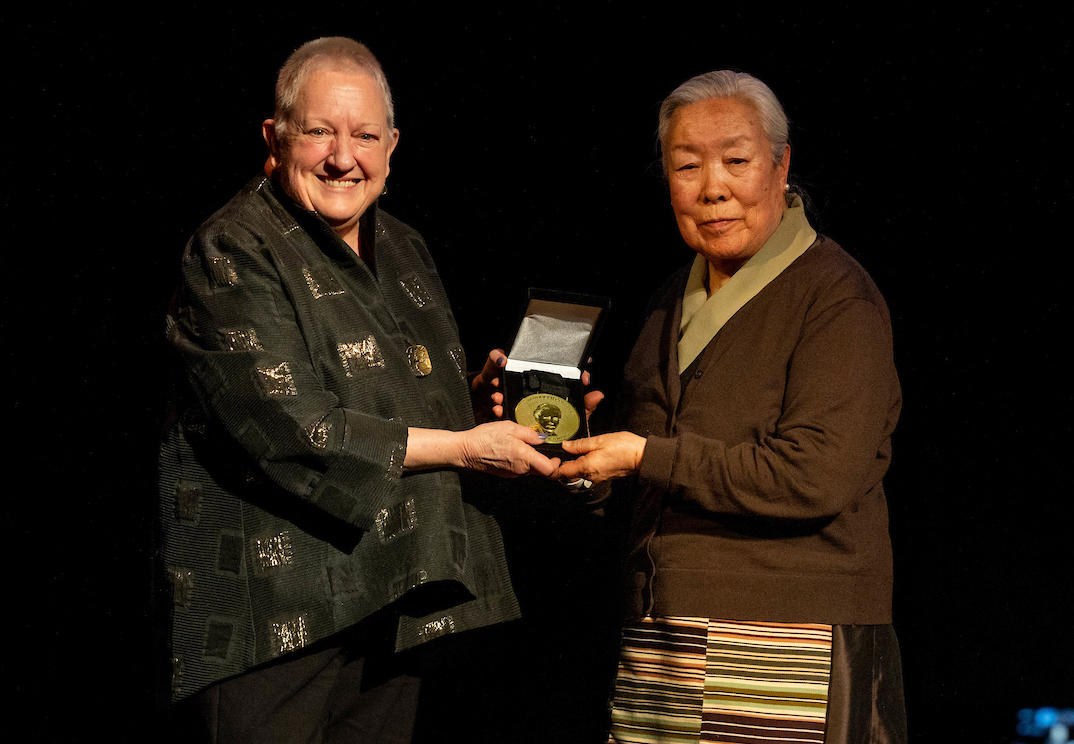By Hoi Sin Lai
Two Western Student Association senators apologized Sunday for the portion of Resolution No. 6 which urged Western Michigan University”s administration to remove the Chinese flag hanging in the promenade on main campus, according to the Office of International Student and Scholar Services (OISS).
WSA Sens. Matthew Hall, a sophomore majoring in business management, and Joseph Wood, a freshman majoring in political science, proposed the resolution in the WSA meeting on Feb. 19. According to Jin Abe, admissions/program coordinator of the OISS, Hall and Wood sent him and the Association of Chinese Scholars and Students (PRC) the statement of retraction, and apologized for unintentionally offending Chinese students.
Derondal Bevly, public relations chair for the WSA and senior majoring in economics, said Hall and Wood didn”t realize that the resolution would harm Chinese and international students, and this was not their intention. Since Feb. 19, according to Bevly, WSA has received a lot of feedback from international student groups, various departments on campus and universities across the country. After looking at the situation, Hall and Wood decided to apologize and look at the resolution to develop a better way to propose it, Bevly said.
“The main thing we want to convey to students is that the WSA is by no means here to discriminate or segregate student groups,” Bevly said.
Bevly said all student groups, especially the international students affected by the resolution, are encouraged to come to the next WSA meeting to express their comments, concerns and possible ideas for the issue. He said WSA wants both sides to get together and discuss the issue to come up with the best solution to the problem.
Resolution No. 6 suggests that the Chinese flag hanging in the promenade should be removed because the flag, which symbolizes its “soviet-style” communist government, conflicts with WMU”s mission and values.
In the resolution, WSA states that the Chinese government violates the Universal Declaration of Human Rights with practices such as forced abortions and sterilization of women violating its birth quotas, restriction on free practice of religion and crimes against the Tibetan people. Flying the Chinese flag is a symbol of support for its conduct, according to the resolution. During the WSA meeting Feb. 19, the supporters also made a distinction that the Chinese flag represents the Chinese government, but not Chinese people.
WMU students said the resolution disappointed international students, and the meaning behind the national flags on campus is far more complicated than only representing the governments.
Yuenlei Zhu, president of Association of Chinese Scholars and Students (PRC) and a doctoral student in economics from China, said the Chinese flag represents its culture and history. When the flag is hanging on campus, it also represents respect for Chinese students, he said.
“When I saw the flag (on campus), I was happy,” Zhu said. “(The Chinese flag) recognizes me. Maybe I”m welcome here. When you remove it, it means that at WMU, China doesn”t exist.”
Zhu added that some American students may not care about the Chinese flag, but as a Chinese student, the flag is very important to him. Zhu said he thinks of his deceased grandfather every time he looks at the Chinese flag.
“I care, we care; Chinese people care, because this is our flag,” Zhu said.
The OISS is in charge of putting up the flags in the promenade. According to the its Web site, the OISS fully plans to fly the current six flags, including the Chinese flag, until their rotations are up in April, in accordance with the university”s missions and values.
According to Abe, former WMU President Diether Haenicke designed a plan to build the poles in the promenade, intending to celebrate the international and intercultural diversity of the university by showing the international flags.
Abe said removing the Chinese flag is offensive to the Chinese and international community on campus, even though the drafters of the resolution didn”t realize that they were harming others.
“When someone steps on your toe, even unintentionally, it still hurts,” Abe said.
Burgitta Ho, president of Hong Kong Student Association and a senior from Hong Kong majoring in organizational communication and Asian studies, said a national flag represents its country, citizens, culture and history. When international students see their flags on campus in the United States, they think of their countries, Ho said.
As a student from Hong Kong, Ho said she is not very connected to mainland China, as Hong Kong used to be a British colony. However, after the flag removal incident, Ho said she thinks the Chinese flag is related to her.
“I used to think that I am barely connecting to China, but now, I strongly feel that (the flag incident) is the business of Hong Kong people,” Ho said.
Astrid Wargenau, a graduate student from Germany majoring in geography and the president of International Programs Council (IPC), a student organization dedicated to promoting cross-cultural understanding though organizing different events and activities on campus, said she was disappointed at the WSA and its president, John Knowles, who supported the resolution.
“(Knowles) has been to our (IPC) meeting,” Wargenau said. “He talked in our meetings and said how much he appreciated that we were there and IPC was there, because we”re diverse and we made Western more cultural, we add so much to Western. And I find his recent comments (on the resolution) rather contradictory to that. I am really disappointed.”News 2/24/03 check punctuation on this please.
Wargenau said it is very wrong for the supporters of the resolution to say that they are not attacking the people of China but the Chinese government. She said people feel very closely connected to their flag when they look at it because the flag stands for the people of the country.
“A flag is a symbol of the country,” Wargenau said. “Everybody does belong to that country, which includes the government, but it”s the people who make the country.”
American students also said that removing the flag is inappropriate.
“I think it”s ridiculous,” said Angela Sillmon, senior majoring in computer information systems. “Western is made up of so many international students.”
She said the flag represents the heritage of international students attending WMU.
“The Chinese flag is giving Chinese students who are from overseas something to represent their heritage with,” Sillmon said. “If they are going to take the Chinese flag down, they have to take the rest of the flags down, because if they are saying the Chinese flag conflicts with the mission, I know the rest of the others do.”
Alexander Donovan, senior majoring in aviation and Asian studies and president of Chinese Language and Culture Club, said the resolution is insulting to Chinese students of WMU. Donovan said the drafters of the resolution, Hall and Wood, intended to complain about China, but they didn”t do much research about it and they don”t understand how fast China is changing right now.
Donovan said he and Zhu informally talked to the two drafters on Feb. 21, and found the drafters don”t know much about China.
“I think what really bothers me is the fact that they know nothing about China,” Donovan said. He is an American who had worked in China for three years. “They don”t know China. They don”t know the economic situation. They don”t even understand the symbolism of the flag. I asked them to name the three top leaders of the Chinese Communist Party. They couldn”t even name one.”
Zhu said he also complains and doesn”t like the Chinese government, but the Chinese flag will always represent him because he is from China. He added that China still has many problems. If people want to help and are concerned about China, Zhu said they should learn about the country instead of offending Chinese people.
Before the statement of retraction and apology was issued, Zhu said he and the members of Association of Chinese Scholars and Students hope the WSA remove the resolution immediately and apologize for the resolution.
“(The resolution) must be stopped, no deeper hurt,” Zhu said. “We”ve already been hurt. I don”t want to go to the meeting again. It will hurt more.”
According to Bevly, WSA will contact several international groups and get feedback from other students on campus to see if something should be pursued, changed or tabled permanently in the resolution. Those options will be discussed and the official retraction of the statement about the flag will be brought up in the next WSA meeting. Further discussion of the resolution will take place after spring break.
Bevly added that when a resolution is proposed, it doesn”t mean that the resolution will be passed or that WSA is going to take action.
“Being proposed means the senators have an idea about the issue on campus,” Bevly said. “They have the right to present that to the WSA and do it in the right manner. Being proposed doesn”t mean that it was voted on.”
He said proposals are simply issues that the WSA will debate.
“There are so many issues and aspects that have to be debated before the final decision is made,” he said.
The next WSA meeting will be held at 4:15 p.m. Wednesday in Room 147-149 of the Bernhard Center.









